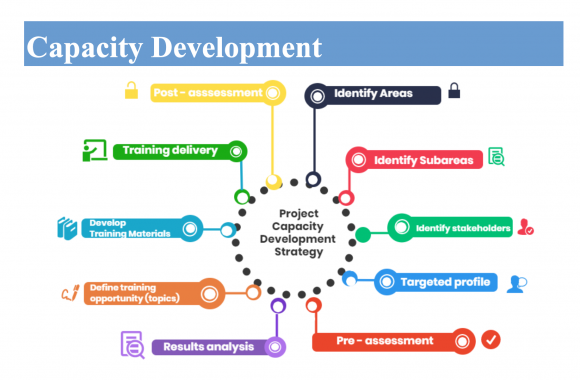The project capacity development strategy is developed and validated with Department of Fisheries.
Project capacity development initiatives for each of the lead areas are planned at all levels; State, Region and Union. Beyond the Union level, at the community level, this capacity development will be delivered by the Implementing Partners (IPs) consisting of NGOs, University, IFT and DoF officials. Letters of Agreement (LoA’s) are being established with these IPs for the duration of the project and they will be the main providers for training delivery at the village/community level. A key challenge facing the project is the cascade delivery of training through different levels. The project delivers training at the state level which considers some skills in training of trainers in addition to technical content and process delivery. Typically, these courses are 2 times as long as those then delivered at the regional level in the same subject and up to 3 times as long as those delivered at the union level. For example, the 9 day Ecosystem Approach to Aquaculture Management, Capacity Plus and ToT, is followed by a 5 day version at the Regional level and a 3 day version for IPs at the Union level.
The detailed process of capacity development is presented in the figure above; find out more details on capacity development strategy on http://fishadapt.org/en/resources/technical-resources/capacity-development-strategy-fishadapt-project.
The project has signed a service contract with IMA International, a specialized international firm on Capacity Development in areas related to the project objectives, for supporting to the project team on designing the above referred strategy, but mainly for providing quality assurance (QA) along the process. The QA has guaranteed that all the capacity opportunities, including the training material produced, have been done with the highest possible standards.
Regarding training principles, training effectiveness and quality assurances, with the guidelines of IMA international, the project has been aiming and applying these training principles and approaches before, during and after the trainings since trainings delivered in 2019 up to in 2020.
The project also aims to share these training principles and capacity development approaches with the Department of Fisheries and other related authorities for their capacity development in 2020.
Key principles applied to each level of the project’s trainings are
1) always know the audience ( select the right participants for the specific training opportunity)
2) be gender responsive
3) participatory approache
4) high quality always
5) focusing on applicability and
6) observe a quality checklist for the design of the courses.
In addition, effectiveness of the training sessions has been monitored by the practical application of these approaches, such are; the reaction level, the learning level, the pre-post knowledge assessments, course evaluation, the after-action review of the leads trainers, etc.
Training report (course report) is based on the use of the current “activity report” template designed by the project. This template gathers information of the course title, the participants, the participation of any of the stakeholder organizations, the findings, the expected results (pre-post-test), outcomes, feedbacks (course evaluation, after action review), lessons learned and recommendations. Additionally, a post assessment (knowledge, attitudes and behaviour change) will be conducted by the end of the project by the M&E team, for monitoring impacts.








